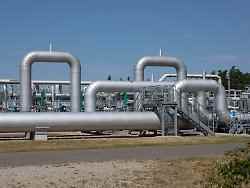Rising energy prices
With gas allocation is better than without gas allocation
A comment by Jan Ganger
08/15/2022, 4:18 p.m
Anyone who uses gas will soon have to pay more for it than before. This is precisely why the gas levy is a good idea.
The gas levy is coming. This is not good news for consumers. You have to be prepared for significantly higher costs. For this reason it is right to introduce the levy.
Higher costs are a very strong incentive to save. And Germany urgently needs to reduce gas consumption. According to Federal Network Agency boss Klaus Müller, 20 percent of gas must be saved in Germany in order to get through the autumn and winter well. The gas levy will contribute to this.
Gas prices have skyrocketed because of the Russian war of aggression in Ukraine and cutbacks in Russian gas supplies to Germany. This puts some suppliers in trouble – above all Uniper, where the state had to get involved.
The suppliers have to buy expensive replacements for the short-term delivery failures and have not been allowed to pass on these enormously increased procurement costs to their customers. The gas surcharge is intended to enable them to pass on at least part of the higher costs to customers.
There are good arguments against the surcharge. It is unfair that gas consumers are now helping to help suppliers. But it is important that the state does not completely override the steering function of prices. A look at Hungary, for example, shows this: there, a price cap imposed by the government meant that petrol became scarce in some places. The price, which was kept artificially low, meant that fuel consumption did not decrease, but increased.
In addition, the announced gas surcharge should be manageable for many. From October, households and industry will have to pay an additional 2.4 cents per kilowatt hour. For an average household of four, that’s an additional cost of around 480 euros a year – not including VAT.
However, many will not be able to bear the additional burden at all or only with great difficulty. they must be helped – in a targeted manner and not according to the watering can principle as with the nine-euro ticket or the fuel discount. Not everyone needs help. The state cannot cushion all hardships. But he can relieve those who need it. And that is exactly what the federal government must do in view of the rapidly increasing energy prices.
Against this background, it would make sense to levy VAT on the gas surcharge. Of course, the income must be used in return to relieve low and middle incomes. It is socially fair if the consequences of high gas prices are borne primarily by those with higher incomes who can afford it. It is economically wise to let prices do their steering function.
